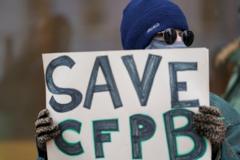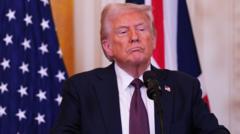In a shocking turn of events, the Consumer Financial Protection Bureau faces potential closure as Musk's Doge group pushes for government austerity, raising alarm bells over consumer data safety.
Musk and Doge Target CFPB in Controversial Government Overhaul

Musk and Doge Target CFPB in Controversial Government Overhaul
Elon Musk's Department of Government Efficiency takes drastic measures against consumer protection agency amid widespread protests.
In a decisive maneuver, the Trump administration's Department of Government Efficiency (Doge), led by Elon Musk, has initiated steps to take control of the Consumer Financial Protection Bureau (CFPB). Established during the aftermath of the 2007-2008 financial crisis, the CFPB is tasked with safeguarding consumers and regulating financial institutions. The recent actions include the installation of former White House budget director Russell Vought as the agency's head, along with gaining access to its internal systems, raising concerns among advocates and employees alike.
On Saturday, around 100 demonstrators protested outside the CFPB's Washington office, voicing their opposition to the encroachment by Musk's team, which has already targeted several other government departments, including USAID. Although detailed information on Doge's structure remains elusive, its influence is becoming increasingly apparent after gaining "read-only" access to the CFPB's sensitive data, which may include extensive consumer information.
Maxine Waters, the top Democrat on the House Financial Services Committee, slammed the takeover as a significant threat to consumer privacy and protection. "Musk's actions regarding the CFPB are alarming, as he now has access to personal data from countless citizens seeking help after financial wrongdoing," Waters asserted. The National Treasury Employees Union has echoed these fears, warning of potential breaches in data security.
Despite the administration's denial of any intent to dismantle the CFPB, Musk has made his position clear through social media, suggesting the agency’s operations may soon come to an end. Criticisms have been amplified by claims that the CFPB was established based on the necessity for consumer protection, a sentiment not shared by certain Republican factions who view its regulation efforts as excessive.
In a broader context, this latest move raises critical questions about the future of consumer finance and the extent of government authority in protecting citizens’ financial rights. As developments continue to unfold, the implications of these alterations in oversight and governance remain to be seen.
On Saturday, around 100 demonstrators protested outside the CFPB's Washington office, voicing their opposition to the encroachment by Musk's team, which has already targeted several other government departments, including USAID. Although detailed information on Doge's structure remains elusive, its influence is becoming increasingly apparent after gaining "read-only" access to the CFPB's sensitive data, which may include extensive consumer information.
Maxine Waters, the top Democrat on the House Financial Services Committee, slammed the takeover as a significant threat to consumer privacy and protection. "Musk's actions regarding the CFPB are alarming, as he now has access to personal data from countless citizens seeking help after financial wrongdoing," Waters asserted. The National Treasury Employees Union has echoed these fears, warning of potential breaches in data security.
Despite the administration's denial of any intent to dismantle the CFPB, Musk has made his position clear through social media, suggesting the agency’s operations may soon come to an end. Criticisms have been amplified by claims that the CFPB was established based on the necessity for consumer protection, a sentiment not shared by certain Republican factions who view its regulation efforts as excessive.
In a broader context, this latest move raises critical questions about the future of consumer finance and the extent of government authority in protecting citizens’ financial rights. As developments continue to unfold, the implications of these alterations in oversight and governance remain to be seen.























